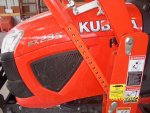If you want 5 only ways to be safe, you can ask 5 other people. But, generally speaking, what everyone is telling you is that you need to be smarter than what you're working on. If you're not, you'll be testing Darwin's theory of selectivity. You will probably lose that contest if the opposing creature is made of steel. The human body is tough, but not that tough. Darwin's theory suggests the more intelligent creature will win over brute strength every time if that intelligence is applied to protecting the species.
It doesn't take long for an argument to start about how safe someone else's methods are. People are defensive, regardless of which method they use or what accessories they have for their tractor safety. "I've been doing it that way for years" and "my machine has that designed into it" always become the justifications for something they feel is safe enough for them, but if you're not quite comfortable with how safe it is, then I suggest you find a different tactic rather than arguing with someone else how to do it or questioning their luck.
By far, for 'non-removable' loaders, the cylinder blocks are the best alternative if the job that needs to be done requires it be lifted more than a couple hours. But, if it's longer, consider removal. A stripped bolt or damaged pin can be replaced. Your life cannot. If the task requires extended time and increased exposure to the hazard, then certainly improved safety precautions are warranted. Just make sure any prop you select is steel and has appropriate retainers to keep it from falling off. ALWAYS prop both sides if you use a prop. The boom can and will twist enough for it to become unstable, especially if you have some wear in the pins, or worse, it moves the center of gravity to one side by relieving part of the weight on the other side if the prop is on the floor or overhead. We all know what happens when one tips over. Nothing good.
For any QuikTach system, it's MUCH smarter to simply remove the loader. Maybe not quite as convenient as just holding it up for that few minutes to check the air-filter but ask yourself how long it will take for that thing to kill you. A lot less time than it takes to remove the loader, I assure you. It can't fall on you if it isn't close enough to reach you.
How much are you willing to do to keep you alive? That is what you should do to make sure you're safe around that tractor. EVERY TIME. The most dangerous tractor is one that isn't running and is similar to an "unloaded" gun. They're the most dangerous of all, because they breed apathy and complacency. Just like a loaded weapon, ALWAYS treat that tractor like it CAN and WILL kill you. Think about EVERY way it can hurt you and do what has to be done to make sure it cannot. Safety might add a few extra steps and take a bit more time, but how long will it take for that machine to kill you dead? If it can fall on you, block it, remove it, or lower it to the lowest possible position. Gravity is NOT your friend except in the last condition. If it can spray (inject) you, relieve the pressure. If it can roll, chock it (two wheels in both directions, minimum). Do EVERYTHING you can to make sure that you're safe. This goes for any tool or power equipment. Easier to do is seldom a solution in safety. I'd even recommend a check sheet for any maintenance activity you do on the tractor which requires lifting it or part of it to make sure you don't forget "that one little thing" that could save your life. I do, and I don't miss safety steps. Something that has been pounded into my brain for the last 40 years in a career that on a normal day was filled with life threatening dangers and hazards. Some may giggle at excessive standards and methods, but those that use them may get the last giggle.
Your tractor, your life, your choice.


